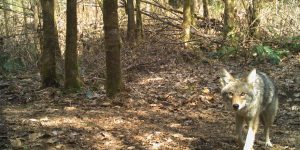Full Report here: APBI495_Final-Research-Report_SimonCampbell34982165
Survey Results Summary Report: Coyote Perception Survey_ Summary Report
The presence of urban coyotes (Canis latrans) in urban environments has created many opportunities for human-coyote conflict, as habituation to humans and human food sources can lead to aggressive and threatening coyote behavior. Effective management practices are fundamentally dependant on public attitudes towards coyotes, therefore it is important to research the human dimensions of coyote conflict. We created a survey to gauge public perceptions and priorities on urban coyotes in the Greater Vancouver Regional District, with the goal of obtaining recent public opinion data. Our survey findings highlight specific trends in public perceptions and priorities regarding coyotes in the Vancouver area, which may be used to inform CwC program directives as well as urban wildlife conservation management strategies. Survey results suggest a broader trend of increasing public support for management strategies that aim for coexistence with coyotes. Public awareness and education on coyotes has increased since 1997, and management strategies that focus on public education are well supported. Continued public outreach efforts that involve educating people on community-level hazing methods are recommended.


Learning Significance